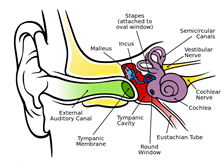What causes tinnitus?
 The causes of tinnitus are varied and often unknown. Sound is ultimately a neurological process stimulated by the mechanical movements in the middle and inner ear. By definition tinnitus is a false signal sent to the brain, and as with any complicated biological mechanism there are multiple points of failure that can create the phantom noise.
The causes of tinnitus are varied and often unknown. Sound is ultimately a neurological process stimulated by the mechanical movements in the middle and inner ear. By definition tinnitus is a false signal sent to the brain, and as with any complicated biological mechanism there are multiple points of failure that can create the phantom noise.
Hearing loss is often, but not always accompanied by tinnitus and in most cases the ringing is an independent issue caused by the factors that led to the hearing loss itself. While a single sound event has been known to cause tinnitus, it most commonly results from long-term exposure to loud noises, especially “impact sounds”.
Things such as the repetitive pounding of a jackhammer or constant hum of an engine create a sort of blunt trauma within the inner ear, damaging the delicate hair cells that transcribe sound waves into neural signals. It is not clear whether the resulting ringing comes from a malfunction of the hair cell itself, damage to the underlying nerve or both, but the results are the same; a constant, potentially maddening buzz.
Pathology of Tinnitus
The pathology of tinnitus can stem from any point in the hearing chain starting with the ear canal and ending centrally with the brain. The eardrum and bones of the middle ear translate the air vibrations into movements of the inner ear membranes. Problems such as infections, cholestomas (growths in the middle ear) and eustachian tube dysfunction can all lead to tinnitus. Otosclerosis for example is an illness affecting as many as 1% of the people in the United States. In otosclerosis, the bones of the middle ear grow over time to become misshapen and interfere with normal hearing function. It is estimated that as many as 60% of cases of otosclerosis are accompanied by tinnitus.
Illnesses of the inner like Meniere’s disease, perilymphatic fistula and infection often also result in tinnitus. In some cases it arises from interference of the mechanical movement of the inner ear, while in others it directly affects the hair cells or nerves. The nerves leading from the inner ear to the brain may also be directly influenced by things such as acoustic neuroma, a small benign tumor that presses against them. This interference leads to specific frequency of tinnitus that is often helpful in its diagnosis.
Less well understood causes of tinnitus may include blood supply and blood pressure, dysfunction of the brain’s hearing centers, allergy, diet and exogenous chemicals like drugs or alcohol. Aspirin and other non-steroidal anti-inflammatories (NSAIDs) have a long standing reputation for causing transient tinnitus, as do sedatives, anti-depressants, quinines and over 200 other medications.
Overall, the causes of tinnitus are broad. Research continues into both the reasons and treatments for tinnitus.
Tinnitus Cognitive Retraining Therapy supports the latest research pointing to the role of neuroplasticity in helping to lower tinnitus level and intensity. In other words, changing your thought patterns over time actually has the effect of rearranging neurons. This might seem surprising; however, this is the very same mechanism through which all learning occurs. And Tinnitus Cognitive Retraining Therapy harnesses your brain’s learning power by directing it to follow new adaptive pathways that in turn lead to significant relief from tinnitus symptoms over the course of treatment.

